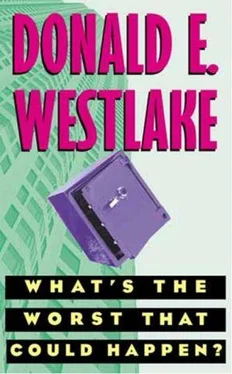He wondered if the Anadarkos were related to Max Fairbanks. Probably not.
“Don’t look now,” May said, “but they’re leaving.”
So naturally Dortmunder looked, and when he turned around of course the woman was facing in this direction anyway, standing beside the table, and she noticed his movement, and she looked him straight in the eye for the second time in one meal. Dortmunder blinked like a fish and faced front, and May said, “I told you don’t look.”
“If you don’t want me to look,” he pointed out, “don’t tell me what they’re doing.”
May looked past his shoulder again. “They’re walking away now,” she said. “He has his arm around her waist.”
“I don’t even care,” Dortmunder said.
It took his entire dessert to get him back in a good mood.
Dinner at the Lumleys’. Lutetia enjoyed the Lumleys because, although they’d been rich for more than one generation, they still liked to talk about money. Harry Lumley was in commercial real estate in various cities around the globe—at the moment, briskly withdrawing himself from Hong Kong and Singapore—while Maura Lumley was in cosmetics, specializing in strangely colored lip and nail treatments for high school girls. “There are millions in those little idiots,” Maura liked to say. “All you have to do is draw it out of them.”
They were ten tonight at the Lumleys’, in their Fifth Avenue penthouse duplex overlooking Central Park just north of the Metropolitan Museum. The other three couples were also rich, of course, the gentlemen being captains of industry, or at least captains of stock shares, and their wives being extremely attractive in that lacquered way required of women who have married recent money. The conversation ranged over politics and taxes and dining experiences around the globe. It was all very pleasant, very ordinary, very reassuring, and it wasn’t until the sorbet that Lutetia noticed Max wasn’t saying anything.
Now what? Managing Max was a full-time job, and not always an easy one. Lutetia didn’t mind the work, she knew she was good at it, but there were times when she wished he had come with an owner’s manual. Usually at an evening like this, Max would be very much an element of the party, full of gossip, full of jokes about politicians, full of ethnic humor and racial humor and class humor and economic humor, but tonight he was merely being attentive, smiling at other people’s humor, eating distractedly, adding nothing to the occasion, looking at his watch from time to time.
He’s a million miles away, Lutetia thought, but in which direction?
From that point, through the rest of the meal and on to the brandy or port on the terrace afterward, Central Park a great black sleeping beast stretched out below them, Lutetia did her best to involve Max, stimulate him, make him enter into the spirit of the occasion. She even went so far as to remind him of two or three of his favorite stories, asking him to regale the group with them; something she never did. And the worst of it was, he readily agreed, only to produce an amiable but mechanical recital, without his usual clever dialects and mischievous facial expressions, so that his efforts—or hers, through him—produced only mild laughter, merely polite.
He wasn’t sullen , he didn’t appear to be angry , his manner wasn’t what you could call worried , there was nothing hostile about him. He just wasn’t Max, that’s all. Lutetia began to be afraid.
It wasn’t until they were in the limo, going through dark Central Park on their slightly roundabout way home, that the penny, or the shoe, or whatever it was, dropped. Lutetia had resolved not to raise the subject, not to pose any questions, not to do a thing except watch Max with extreme care, ready to jump at the slightest unexpected sound, so he was the one who at last broached the topic: “The judge,” he said.
She looked at him, alert, wary. “Yes?”
“He apparently has . . . I’ve apparently given him power over me beyond . . . It’s certainly not what I thought this legal square dance was all about.”
“He displeased you.”
“If he were crossing the road ahead of us,” Max said, gesturing at the winding blacktop road in the dim-lit leafy park, “I’d have Chalmers run him down.”
Chalmers was the driver. Mildly, Lutetia said, “Do you think Chalmers would do it?”
“If I told him to, he’d damn well better.”
“What did the judge do, my dear?”
There were really quite a few lights in the park. Max’s face was now plain, now in shadow. It seemed to Lutetia his expression was pained. “He humiliated me,” he said.
Oh, dear. Lutetia well knew there was little short of death you could do to Max Fairbanks worse than that. She herself might argue with him, defy him, even sneer at him, but she would make damn sure she was out of the country first, if she ever decided it had become necessary to humiliate him; by divorce, for instance, or a public affair with a poor person. Sympathizing, grateful to Max for having shared his pain with her, she took his hand in both of hers and said, “You give these little people power, Max, they don’t always use it well.”
In the next passing streetlight, she could see his grateful smile, and smiled back. She said, “Tell me what he did.”
“First he threatened to open the entire Chapter Eleven again, which would cost us millions. Literally, millions. Walter and that other fellow, Weisman, groveled at the bastard’s feet while I sat quietly in the background—”
“Good.”
“And at last he agreed to a compromise. And even that I didn’t understand until afterward, when the lawyers explained it to me.”
They were out of the park now, driving down the well-lit Seventh Avenue, and Lutetia could see Max plain. What he had been covering back at the Lumleys’, hiding with a veneer of polite good humor, was a haggard vulnerability, an uncharacteristic self-doubt. Still holding his hand in both of hers, she said, “What was it? What did he do?”
“He took away the Carrport house.”
This was so unexpected she very nearly laughed, but realized in time that Max would not put up with being laughed at over this matter. Swallowing her amusement, she said, “What do you mean, took it away?”
“It has to be sold, and the proceeds added to the Chapter Eleven pot.”
Lutetia studied him, not understanding. “I don’t see—That’s annoying, of course, but why does it hit you so hard ?”
They were stopped at a traffic light. He shook his head, angry with himself, and looked out at busy midtown, just before midnight. “I suppose I’ve made a fetish of that house,” he said. “I enjoyed—You were never there.”
“You never wanted me there.”
“You never wanted to be there.”
That was true. The Carrport house was a part of Max’s corporate business, and nothing to do with her. It was used for corporate matters of various kinds, which would bore her, and also, she suspected, for hanky-panky, about which she didn’t want to know. “I wasn’t interested in a suburban house on Long Island,” she acknowledged. “But why was it so important to you?”
“ I was the host out there,” he said. “The master, the thane. I enjoyed that, bringing management out, being, I don’t know, lord of the manor or some such thing. That was the only place where I was physically the commander of my armies, all gathered around me. Feudalism, I suppose. It may sound foolish . . .”
“As a matter of fact,” she told him, “it sounds quite real. Not something you would have normally told me.”
“That’s true enough.” Max shook his head. “Not something I’d even told myself before. I never understood how important Carrport was to me.”
Читать дальше












